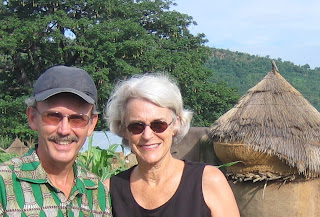But in Togo, they really know how to Wait. As we write this one week before Christmas, there is no sign of Christmas. No advertisements, no grand finale sales, (imagine the very biggest store in Atakpamé, a grocery store, being smaller than most 7-11s), no Christmas trees, no twinkling lights, no festive sweaters, scarves or gloves (or tank tops), and unfortunately, no Christmas concerts. We have heard that two days before Christmas, lights will start appearing, at least on some of the homes that have electricity.
We think we are integrating pretty well into the Togolese culture. (You might have enjoyed seeing us learn the traditional circle dance to drums in the street the other night. The locals loved it). But in the privacy of our home we are looking more American. We have “already” put up a string of Christmas (we don’t call them holiday) lights, we have an 8” wooden Swedish Advent tree with candles on our table, a poinsettia table runner and wall hanging, and we are playing Christmas music. Tonight we attended a concert: Handel’s Messiah, by the London Philharmonic—right in the comfort of our home (on the 2 inch speakers of our laptop). After the concert, we went out for dessert (moving to our tiny kitchen). OK, it wasn’t the same as our favorite place in Seattle, Decadent Desserts, but the Oreo’s sent from the US were a very good second.
Christmas trees would be a real anomaly here, where deforestation is a blight on the land. Wood is a rapidly diminishing resource which is used primarily for cooking and furniture. We are not missing a tree this year.
Gifts? We think the Togolese don’t place a lot of importance on them—unless they are from the rich Americans. We are often asked to give gifts (like our watch, our camera), but it has nothing to do with Christmas. We have noticed a sudden introduction of the sale of balloons (not inflated yet) on the streets, so we think that balloons might be a typical gift for the children. We don’t see any toys for sale. What we see is poverty that is hard to escape and people who are coping with it.
Another observation: Even in the midst of poverty the household budgets seem to accommodate good holiday appearance for the women. The “coiffure” (hairdresser) business is really picking up. The women are looking very elegant indeed! Their tresses (braids, etc.) last for up to 2 weeks, and it appears they are getting ready for Christmas with complex, beautifully designed hairdos.
We had a delightful time yesterday teaching a Christmas carol, “Silent Night, Holy Night”, to a group of youth that meets every Saturday. They seemed to recognize the tune from the radio and were eager to learn the English words. (Jingle Bells also). Then we became the students and they taught us a song in French. We all laughed and it was good for them to see us struggle with the song they sang so beautifully.
To anyone reading this, we wish you a blessed Christmas, happy Chanukah, or simply joyful holiday season. Whatever is appropriate for you. (I hear celebratory drumming in the background which reminds me not to forget the animists, whose beliefs seem to be interwoven with the newer Christian and Muslim faiths here). For us, we will be missing family and friends, but celebrating Christmas on the coast in Accra, Ghana, where we hope to find a place to worship with other Christians.



